
Lemon balm, balm, common balm, or balm mint, is a perennial herbaceous plant in the mint family Lamiaceae and native to south-central Europe, the Mediterranean Basin, Iran, and Central Asia, but now naturalized in the Americas and elsewhere.
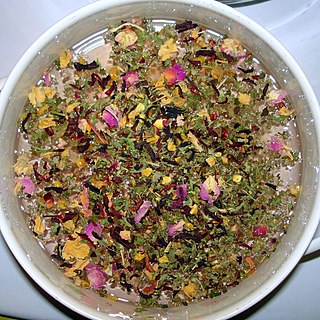
Herbal teas—less commonly called tisanes —are beverages made from the infusion or decoction of herbs, spices, or other plant material in hot water. Perhaps some of the most known tisanes are actual, true teas, which are prepared from the cured leaves of the tea plant, Camellia sinensis. Besides coffee and true teas, most other tisanes do not contain caffeine.

Valerian is a perennial flowering plant native to Europe and Asia. In the summer when the mature plant may have a height of 1.5 metres (5 ft), it bears sweetly scented pink or white flowers that attract many fly species, especially hoverflies of the genus Eristalis. It is consumed as food by the larvae of some Lepidoptera species, including the grey pug.
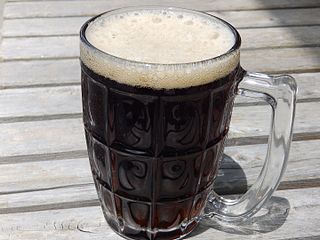
Root beer is a sweet North American beverage traditionally made using the root bark of the sassafras tree Sassafras albidum or the vine of Smilax ornata (sarsaparilla) as the primary flavor. Root beer is typically but not exclusively non-alcoholic, caffeine-free, and carbonated. It usually has a thick and foamy head when poured. Modern, commercially produced root beer is generally sweet, foamy, carbonated, non-alcoholic, and flavored using artificial sassafras flavoring. Sassafras root is still used to flavor traditional root beer, but since sassafras was banned by the U.S. Food and Drug Administration due to the carcinogenicity of its constituent safrole, most commercial recipes do not contain sassafras. Some commercial root beers do use a safrole-free sassafras extract. Major producers include A&W Root Beer, Barq's, Dad's Root Beer, Hires Root Beer, and Mug Root Beer.

Guarana, Paullinia cupana, syns. P. crysan, P. sorbilis) is a climbing plant in the family Sapindaceae, native to the Amazon basin and especially common in Brazil. Guarana has large leaves and clusters of flowers and is best known for the seeds from its fruit, which are about the size of a coffee bean.

Yerba mate is a species of the holly genus (Ilex), with the botanical name Ilex paraguariensis A. St.-Hil., named by the French botanist Auguste François César Prouvençal de Saint-Hilaire.

Chamomile or camomile is the common name for several daisy-like plants of the family Asteraceae. Two of the species are commonly used to make herbal infusions for traditional medicine, although there is no evidence that chamomile has any effect on health or diseases.

Ajwain, ajowan, or Trachyspermum ammi—also known as ajowan caraway, bishop's weed, or carom—is an annual herb in the family Apiaceae. Both the leaves and the seed‑like fruit of the plant are consumed by humans. The name "bishop's weed" also is a common name for other plants. The "seed" is often confused with lovage "seed".

Chinese herbology is the theory of traditional Chinese herbal therapy, which accounts for the majority of treatments in traditional Chinese medicine (TCM). A Nature editorial described TCM as "fraught with pseudoscience", and said that the most obvious reason why it has not delivered many cures is that the majority of its treatments have no logical mechanism of action.

Salvia officinalis is a perennial, evergreen subshrub, with woody stems, grayish leaves, and blue to purplish flowers. It is a member of the mint family Lamiaceae and native to the Mediterranean region, though it has naturalized in many places throughout the world. It has a long history of medicinal and culinary use, and in modern times as an ornamental garden plant. The common name "sage" is also used for a number of related and unrelated species.

Herbal medicine is the study of botany and the use of medicinal plants. Plants have been the basis for medical treatments through much of human history, and such traditional medicine is still widely practiced today. Modern medicine makes use of many plant-derived compounds as the basis for evidence-based pharmaceutical drugs. Although herbalism may apply modern standards of effectiveness testing to herbs and medicines derived from natural sources, few high-quality clinical trials and standards for purity or dosage exist. The scope of herbal medicine is sometimes extended to include fungal and bee products, as well as minerals, shells and certain animal parts.
Nootropics are drugs, supplements, and other substances that may improve cognitive function, particularly executive functions, memory, creativity, or motivation, in healthy individuals. While many substances are purported to improve cognition, research is at a preliminary stage as of 2020, and the effects of the majority of these agents are not fully determined.

Medicinal plants, also called medicinal herbs, have been discovered and used in traditional medicine practices since prehistoric times. Plants synthesise hundreds of chemical compounds for functions including defence against insects, fungi, diseases, and herbivorous mammals. Numerous phytochemicals with potential or established biological activity have been identified. However, since a single plant contains widely diverse phytochemicals, the effects of using a whole plant as medicine are uncertain. Further, the phytochemical content and pharmacological actions, if any, of many plants having medicinal potential remain unassessed by rigorous scientific research to define efficacy and safety.
Altovis is a herbal supplement. Its main active ingredients are caffeine and ginseng.
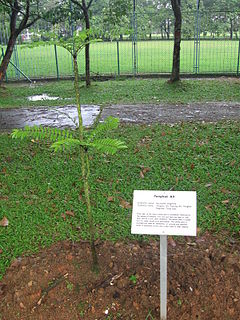
Eurycoma longifolia is a flowering plant in the family Simaroubaceae. It is native to Indochina and to the islands of Borneo and Sumatra. The plant is a medium-sized slender shrub that can reach 10 m (33 ft) in height, and is often unbranched. The root of the plant has been used in folk medicine of the South East Asian region, and in modern times has common use as supplements, as well as food and drink additives. There is no clinical data supporting the effectiveness of Eurycoma longifolia for any health benefit.

Theanine, also known as L-γ-glutamylethylamide and N5-ethyl-L-glutamine, is an amino acid analogue of the proteinogenic amino acids L-glutamate and L-glutamine and is found primarily in particular plant and fungal species. It was discovered as a constituent of green tea in 1949; in 1950, it was isolated from gyokuro leaves. Theanine provides a unique brothy or savory (umami) flavor to green tea infusions.
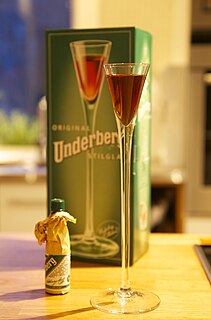
Underberg is a digestif bitter produced at Rheinberg in Germany by Underberg AG, made from aromatic herbs from 43 countries, which undergo inspections and are based on a secret Underberg family recipe whose members are personally responsible for the production of the drink. Underberg is one of the most widespread kräuterlikörs on the market. Underberg contains 1.3 percent herbal extract by weight, which includes aromatic, digestion-stimulating, relaxing and calming active substances, and naturally occurring vitamin B1. The drink matures in Slovenian oak barrels for several months to enhance the flavour. Underberg is classified under "food and drinks: oils, herbs and spices" in the United States and can be sold without any sort of liquor license.

Peumus boldus, the only species in the genus Peumus, is commonly known as boldo. This tree of the family Monimiaceae is natively endemic to the central region of Chile, occurring from 33° to 40° southern latitude. Boldo has also been introduced to Europe and North Africa, though it is not often seen outside botanical gardens.
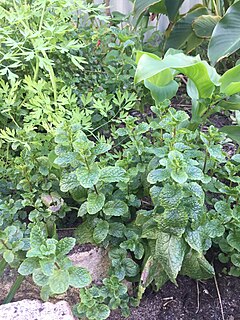
In general use, herbs are plants with savory or aromatic properties that are used for flavoring and garnishing food, medicinal purposes, or for fragrances; excluding vegetables and other plants consumed for macronutrients. Culinary use typically distinguishes herbs from spices. Herbs generally refers to the leafy green or flowering parts of a plant, while spices are usually dried and produced from other parts of the plant, including seeds, bark, roots and fruits.

















